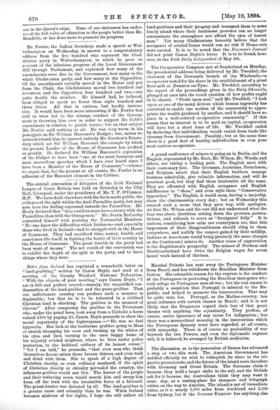Notes from Ireland has reprinted a remarkable letter on "
land.grabbing," written by Canon Doyle, and read at a meeting of the County Wexford National Federation. " With the objects of your meeting," says Canon Doyle, "I am in full and perfect accord,—namely, the unqualified con- demnation of the land-grabber and the grass-grabber. That our unfortunate country can produce such a monster is deplorable; but that he is to be tolerated in a civilised Christian land is shocking. The grabber is the meanest of thieves." After comparing the grabber to the Protestant who, under the penal laws, took away from a Catholic a horse valued 2100 by paying £5, Canon Doyle proceeds to show the moral superiority of the highwayman :—" He was no foul hypocrite. But look at the loathsome grabber going to Mass or church thumping his craw and turning up the whites of his eyes, and then turning to the once happy home of his unjustly evicted neighour, where he lives under police protection, to the habitual robbery of its honest owner." "Yet I am told," he proceeds, "that even men who think themselves decent salute these brazen thieves, and even walk and drink with them. Not to speak of a high degree of Christian charity, or even ordinary manhood, if the spirit of Christian charity or chivalry pervaded the country, the infamous grabber would not live. The horror of the people , and their withering scorn would scorch him and sweep him from of the land with the irresistible force of a blizzard. The priest-hunter was detested by all. The land-grabber is , a greater curse and calamity than he was. When Ireland becomes mistress of her rights, I hope she will collect all
land-grabbers and their progeny and transport them to some lonely island where their loathsome presence can no longer contaminate the atmosphere nor offend the eyes of honest men." Yet many Gladstonians honestly believe that the- occupants of evicted farms would run no risk if Home-rule were carried. It is to be noted that the Freeman's Journal did not print Canon Doyle's letter. It is to be found, how- ever, in the Irish Daily independent of May 4th.






































 Previous page
Previous page